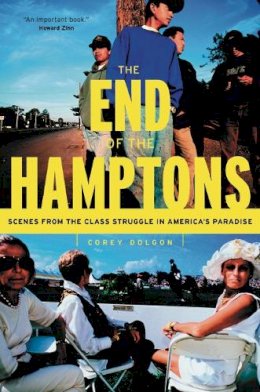
The End of the Hamptons. Scenes from the Class Struggle in America's Paradise.
Corey Dolgon
Winner of the 2005 Book Prize from the Association for Humanist Sociology
A portrait of the contentious, controversial history of the Manhattan elite's favorite fabled summer playground
In this absorbing account of New York’s famous vacation playground, Corey Dolgon goes beyond the celebrity tales and polo games to tell us the story of this complex and contentious land. From the displacement of Native Americans by the Puritans to the first wave of Manhattan elites who built the Summer Colony, to the current infusion of telecommuting Manhattanites who now want to live there year-round, the story of the Hamptons is a vicious cycle of supposed paradise lost.
Drawing on this fabled land's history, The End of the Hamptons provides a fascinating portrait of current controversies: the Native Americans fighting over land claims and threatening to build a casino, the environmental activists clashing with the McMansion builders, and the Latino day laborers and working-class natives trying to eke out a living in an ever-increasingly expensive town.
Product Details
About Corey Dolgon
Reviews for The End of the Hamptons. Scenes from the Class Struggle in America's Paradise.
Neil Smith,author of American Empire: Roosevelt's Geographer and the Prelude to Globalization "Takes us beyond the much-romanticized beaches of Long Island to the rich entrepreneurs and their McMansions, the Latino workers, and the stubborn indigenous residents refusing to disappear. The book is important because it is in so many ways a microcosm of the nation."
Howard Zinn,author of A People's History of the United States "This superb book focuses on current controversies in the Hamptons. . . . Dolgons treatment of these issues is carefully researched, richly detailed, and original, and presented in a beautifully clear narrative."
David Halle
Contemporary Sociology
"Dolgon tells a history that is balanced and agenda-free"
Foreword Magazine
"[A] very good book. It offers the reader an insightful political-economic analysis of eastern Long Island's microcosm of a class and ethnically divided society. . . . This is a fascinating book for scholars interested in how all these factors play out in a fabled locality."
Antipode, Susan S. Fainstein,Columbia University
